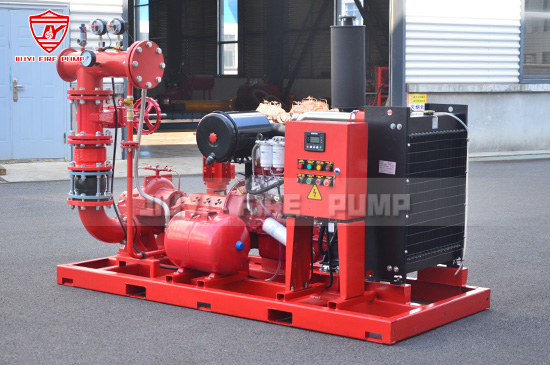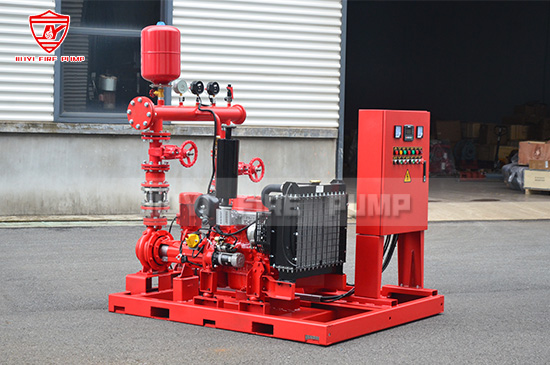Diesel engine fire pumps are a critical component of fire protection systems in commercial, industrial, and residential buildings. When a fire breaks out, these pumps must deliver a reliable water supply to the sprinkler or hydrant system to protect people, property, and assets. One of the most essential specifications to understand when selecting or maintaining a diesel engine fire pump is the duty cycle.
In simple terms, the duty cycle describes how long a fire pump can operate continuously under specific conditions without overheating or experiencing performance issues. For diesel-driven fire pumps, understanding the duty cycle is vital because it directly impacts system reliability, compliance with NFPA 20 standards, and long-term operational safety.
In this article, we’ll explore:
What duty cycle means for diesel engine fire pumps
NFPA 20 and UL/FM requirements
Different duty cycle ratings
How duty cycle impacts system design and maintenance
Best practices to ensure optimal fire pump performance

The duty cycle of a diesel engine fire pump refers to the percentage of time the engine can run at full rated load within a defined period without overheating or sustaining damage.
For example:
A 100% duty cycle means the pump can run continuously without rest.
A 50% duty cycle means the pump should run for only half the time within a given period, followed by a cooling period.
However, unlike many other industrial motors, fire pumps are designed and required to operate at a 100% duty cycle. During a fire emergency, there is no room for limited operation — the pump must deliver maximum performance for as long as needed.
The National Fire Protection Association (NFPA) 20 standard sets strict guidelines for fire pump design, performance, and installation. According to NFPA 20:
“Fire pump drivers, whether electric or diesel, shall be suitable for continuous duty operation at rated load.”
This means:
Diesel engine fire pumps must operate continuously during a fire event.
There is no upper limit on runtime until the fire is controlled or the water source is exhausted.
The engine, cooling system, fuel system, and lubrication system must all be capable of sustaining extended operation.
For UL-listed and FM-approved diesel fire pumps, manufacturers must test engines under full load conditions to ensure they can run continuously without overheating or failure.
While NFPA 20 mandates continuous duty, diesel fire pump engines are often categorized based on their design and operational endurance:
Definition: Engine can run at full rated capacity without interruption.
Application: Mandatory for fire protection systems.
Advantages: Ensures maximum reliability during extended fire events.
Definition: Engine can operate for shorter durations before requiring rest.
Application: Rarely used in fire protection, more common in irrigation or construction pumps.
Risk: Not suitable for NFPA 20-compliant fire protection systems.
Some diesel engines are designed to handle short-term overloads (e.g., 110% of rated capacity for up to 1 hour).
However, this is not a substitute for continuous duty compliance.
The duty cycle of a diesel engine fire pump directly affects system reliability, safety, and regulatory compliance.
During a fire, there is no fixed time limit for how long a pump may need to operate. A continuous duty pump ensures uninterrupted water supply until the fire is under control.
Most insurance companies and fire protection authorities require compliance with NFPA 20. Using a diesel engine not rated for continuous duty may:
Violate safety regulations
Void insurance coverage
Increase liability risks
Non-continuous duty engines are prone to overheating, oil breakdown, and component wear when run beyond their limits. This could result in:
Pump failure during a critical fire emergency
Costly repairs and downtime
Increased safety hazards
Proper testing ensures that your diesel engine fire pump operates at the required duty cycle. NFPA 25 recommends the following:
Run the pump for at least 30 minutes.
Check engine temperature, oil pressure, and abnormal noise.
Test the pump at 100%, 150%, and churn conditions.
Verify that the engine maintains full rated capacity continuously.
Diesel engines rely on either heat exchangers or radiator cooling systems. These must be inspected regularly to prevent overheating during extended operation.
NFPA 20 also sets requirements for fuel storage capacity to support continuous-duty operation:
Diesel tanks must provide at least 8 hours of fuel at the pump’s full-rated load.
For facilities with higher risk profiles, 24-hour fuel capacity may be required.
A continuous-duty pump is only as reliable as its fuel supply. Regular inspections should include:
Checking fuel tank levels
Verifying proper fuel quality
Testing transfer pumps (if used)
To ensure your diesel fire pump delivers continuous operation when needed, follow these best practices:
Use the maintenance schedule provided by your fire pump manufacturer for oil changes, coolant replacement, and filter inspections.
Install monitoring systems to track engine load, RPM, fuel pressure, and exhaust temperature during testing.
Blocked radiators or clogged heat exchangers can cause overheating, especially during extended fire pump operation.
Regularly inspect belts, hoses, injectors, and gaskets. Replace components showing wear before they lead to failure.
Failing to consider the correct duty cycle rating can lead to serious problems:
| Problem | Cause | Impact |
|---|---|---|
| Overheating | Insufficient cooling system | Engine damage, shutdown |
| Oil Breakdown | Excessive runtime without change | Reduced lubrication, wear |
| Fuel Starvation | Undersized tank or poor quality | Pump stops mid-operation |
| Engine Overload | Incorrect sizing | Reduced pump efficiency |
| Non-Compliance | Using intermittent-duty engines | Legal, insurance, and safety risks |
When selecting a diesel fire pump, consider the following checklist:
Ensure UL certification for continuous-duty rating.
Verify compliance with NFPA 20 requirements.
Match the engine capacity to your system’s flow and pressure needs.
Confirm proper fuel storage for extended runtime.
Choose a reputable manufacturer with a proven reliability record.

The duty cycle of a diesel engine fire pump is one of the most critical factors in ensuring fire protection system reliability. NFPA 20 requires continuous duty operation to guarantee that fire pumps can perform without interruption during emergencies.
By selecting the right pump, testing it regularly, and following proper maintenance practices, you ensure maximum performance, compliance, and safety.
At Better Technology Group, we manufacture UL-approved diesel engine fire pumps designed for continuous-duty performance, ensuring your fire protection systems meet the highest safety standards.